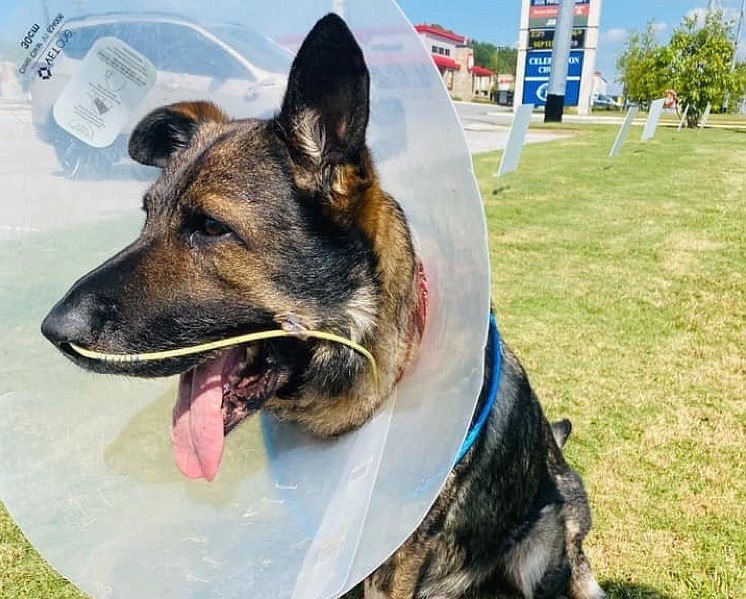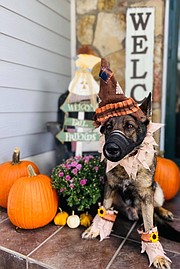A Cleveland, Tennessee, lawmaker wants killing, attempting to kill or injuring a law enforcement K-9 to be a felony in Tennessee and has introduced legislation that could be dubbed "Joker's Law" if it passes the General Assembly.
Rep. Mark Hall, R-Cleveland, said Tuesday in a telephone interview that he drafted the bill during the House's recent special session on COVID-19 legislation to make killing or injuring a police K-9 a "Class B" felony, making it punishable by eight to 30 years in prison and up to a $25,000 fine. The measure would also include horses used by police.
Hall said the proposed legislation is called "Joker's Law," named for Bradley County Sheriff's Office K-9 Joker, who was shot during a pursuit of theft suspects on Sept. 22. Hall's legislation hasn't been assigned a House bill number yet, but he thinks it could become a model for the rest of the nation.
Current law "doesn't move the needle in a positive way, and I think this will. A Class B felony will certainly send a message not only to criminals in Tennessee but throughout the country," Hall said, calling the proposal "pretty aggressive legislation," while it doesn't raise assaulting a K-9 to the same level as a human.
(READ MORE: Bradley County K-9 Joker recovering at home with a long road ahead)
"One unique thing about this bill is if you inflict bodily harm on a K-9 as a juvenile, you can be tried as an adult," he said Tuesday, "therefore, I think this is the most aggressive legislation in the country."
Hall said other legislators like the bill, and he's unaware of any opposition, although there has been no official discussion either way.
"I think Joker will be the poster K-9 of every law enforcement K-9 in the country," Hall said.
Joker was seriously injured six weeks ago by shots allegedly fired by a member or members of a group of six suspects fleeing authorities behind the Toyota of Cleveland dealership at Exit 20 off of Interstate 75 on Sept. 22. The six suspects, all juveniles between ages 13 and 17, were taken into custody in Chattanooga.
The six youths were charged with attempted intentional killing of an animal in connection with Joker's gunshot wounds. The charge for anyone convicted as an adult on first offense is a Class A misdemeanor, which carries up to 11 months, 29 days in jail and/or up to a $2,500 fine, according to state law. A second offense can become a Class E felony, which carries one to six years in prison and up to a $3,000 fine.
The cost of training still comes into play in the severity of charges under current state law.
Tenth Judicial District Attorney General Stephen Crump said in an email response in September the charge against the juveniles in Joker's case is a Class D felony if he survives - a potential sentence of two to 12 years in prison and up to a $5,000 fine. If Joker dies, the charge rises to a Class C felony - three to 15 years in prison and up to a $10,000 fine. Both scenarios are "based on the value of the dog as calculated by the cost of purchasing and training the dog," Crump said.
Tuesday, Crump said in a phone interview he was "very supportive" of Hall's proposal and that a Class B felony simplifies the crime and is what should be on the books for a crime against a member of law enforcement, whether it's the variety with two legs or four legs.
"Any person who will injure or kill a law enforcement K-9 will do the same to a human officer," Crump said. "The seriousness of this offense is found in the fact that a person is willing to use deadly force against law enforcement trying to accomplish an arrest."
The K-9 is an extension of law enforcement officers and shouldn't be valued as a piece of property, he said.
Crump said the proposed law should apply to armed juveniles and treat them as adults, as well.
"If a juvenile has a handgun, it should be transferable to adult court at any age that is currently transferable, from 14 to 18," Crump said.
Attorneys at a Chattanooga law office that provides criminal defense warned against strong measures aimed at minors.
"Careful consideration needs to be given when you start talking about what crimes a juvenile can be charged with as an adult," said Janie Parks Varnell, an attorney with the firm Davis and Hoss in Chattanooga.
Varnell said she and the other three lawyers at the practice understand "there's a public policy incentive to penalize situations where a police K-9 gets injured in the line of duty, " but there could be pitfalls in harsher penalties and sentences for minors under adult guidelines.
Meanwhile, Joker's trials aren't over.
"K-9 Joker is still at home recovering with a feeding tube before he can be considered for jaw reconstructive surgery," sheriff's office spokesperson Alana Shell said in an email. "He has good and bad days, as he is healing one day at a time."
Bradley County Sheriff Steve Lawson applauded Hall's proposal.
"We agree that the criminals who are committing these heinous crimes should be held responsible for their actions and believe Joker's Law will be that source of accountability," Lawson said via email.
Contact Ben Benton at bbenton@timesfreepress.com or 423-757-6569. Follow him on Twitter @BenBenton.

